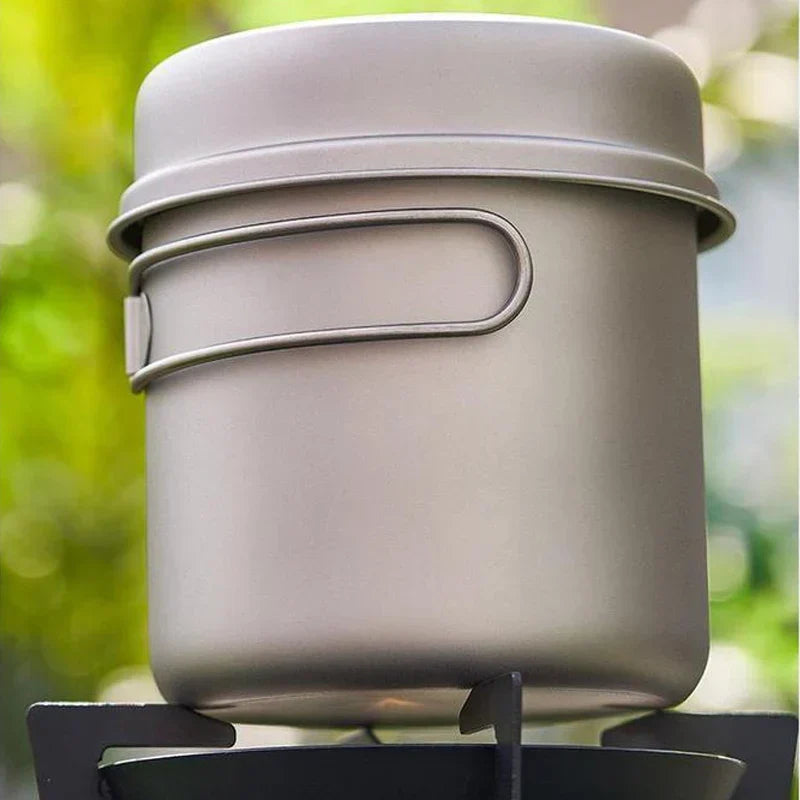
10 Reasons Why Titanium Cookware Outperforms Aluminum for Outdoor Cooking
Share
10 Reasons Why Titanium Cookware Outperforms Aluminum for Outdoor Cooking
When it comes to outdoor cooking gear, the debate between titanium and aluminum cookware has been ongoing for years. While aluminum has been the traditional choice, titanium is rapidly becoming the preferred material for serious backpackers, campers, and outdoor enthusiasts. Here's why.
📋 Quick Comparison: Titanium vs Aluminum
| Feature | Titanium | Aluminum |
|---|---|---|
| Weight | ✅ Lighter | Heavier |
| Durability | ✅ Superior | Good |
| Corrosion Resistance | ✅ Excellent | Poor |
| Health Safety | ✅ Non-reactive | Reactive |
| Price | Higher | ✅ Lower |
1. Superior Strength-to-Weight Ratio
Titanium is approximately 45% lighter than steel and significantly stronger than aluminum per unit weight. This makes it the ultimate choice for ultralight backpacking where every gram counts. A typical titanium pot weighs around 165g compared to 300-400g for equivalent aluminum cookware.
Real-world impact: On a 5-day backpacking trip, switching to titanium cookware can save you 200-300g of pack weight — equivalent to removing 6 eggs from your pack.
2. Exceptional Durability and Longevity
Titanium cookware can last a lifetime with proper care. Unlike aluminum, which dents easily and degrades over time, titanium maintains its structural integrity even after years of outdoor use. It won't warp, bend, or develop weak spots from repeated heating and cooling cycles.
Key benefits:
- Resistant to dents and scratches
- Won't deform under high heat
- Maintains shape even when dropped on rocks
- No coating to wear off over time
3. Complete Corrosion Resistance
One of titanium's most impressive properties is its natural resistance to corrosion. While aluminum oxidizes and can develop pitting when exposed to acidic foods or saltwater, titanium forms a protective oxide layer that prevents further corrosion.
This makes titanium cookware ideal for:
- Coastal camping and beach cooking
- Cooking acidic foods (tomatoes, citrus, vinegar-based dishes)
- Long-term storage without degradation
- Humid or wet environments
4. Non-Reactive and Food-Safe Material
Titanium is completely non-reactive, meaning it won't leach chemicals or metallic flavors into your food — regardless of what you're cooking. Aluminum, on the other hand, can react with acidic or alkaline foods, potentially affecting taste and raising health concerns.
Health advantages of titanium:
- No metallic taste in food
- Zero chemical leaching
- Safe for all food types
- Biocompatible (used in medical implants)
5. Better Heat Distribution (When Designed Properly)
While pure titanium conducts heat slower than aluminum, modern titanium cookware often features optimized designs that ensure even heat distribution. Some premium titanium pots include heat-spreading bases or are designed with specific wall thicknesses to maximize cooking performance.
Pro tip: Look for titanium cookware with slightly thicker bases or heat-spreading technology for the best cooking results.
6. Environmentally Sustainable Choice
Titanium is one of the most environmentally friendly cookware materials available:
- Longevity: One titanium pot can replace dozens of aluminum pots over a lifetime
- Recyclability: 100% recyclable without quality degradation
- No toxic coatings: Doesn't require chemical treatments or non-stick coatings
- Reduced waste: Extreme durability means less frequent replacement
7. Easy Cleaning and Maintenance
Titanium's smooth, non-porous surface makes cleaning remarkably easy. Food doesn't stick as readily as it does to untreated aluminum, and the material won't stain or discolor over time.
Cleaning advantages:
- Wipes clean with minimal scrubbing
- No special cleaning products required
- Won't develop stubborn stains
- Maintains appearance for years
8. Versatility Across Cooking Methods
Titanium cookware excels in various cooking environments:
- Open flame: Perfect for campfires and wood stoves
- Gas stoves: Ideal for portable camping stoves
- Alcohol burners: Compatible with ultralight stove systems
- Induction: Some titanium cookware works with induction cooktops
9. Premium Aesthetic and Modern Design
Beyond functionality, titanium cookware offers a sleek, modern aesthetic that appeals to gear enthusiasts. The natural metallic silver finish looks professional and maintains its appearance without special care.
Many titanium products feature:
- Minimalist, functional designs
- Foldable handles for compact storage
- Graduated measurement markings
- Stackable configurations for efficient packing
10. Long-Term Cost Effectiveness
While titanium cookware has a higher upfront cost, it's actually more economical in the long run. A quality titanium pot can last 20+ years, whereas aluminum cookware typically needs replacement every 3-5 years due to wear, corrosion, or damage.
💰 Cost Comparison Over 20 Years
Titanium: $60 (one-time purchase) = $60 total
Aluminum: $25 × 5 replacements = $125 total
Savings with titanium: $65 over 20 years, plus reduced environmental impact
Conclusion: Is Titanium Worth It?
For serious outdoor enthusiasts, ultralight backpackers, and anyone who values quality gear, titanium cookware is absolutely worth the investment. While aluminum remains a budget-friendly option for casual campers, titanium's superior performance, durability, and health benefits make it the clear winner for those who spend significant time in the outdoors.
When to Choose Titanium:
- Ultralight backpacking and thru-hiking
- Long-distance expeditions
- Frequent outdoor cooking
- Cooking acidic or varied foods
- Coastal or humid environments
- Long-term gear investment
When Aluminum Might Suffice:
- Occasional car camping
- Budget-conscious beginners
- Group cooking (larger volumes)
- When weight isn't a primary concern
Ready to Upgrade Your Outdoor Cooking?
Explore our collection of premium titanium cookware designed for ultralight adventurers. Every piece is engineered for maximum performance with minimum weight.
Shop 1GramLighter Titanium Cookware →
Frequently Asked Questions
Q: Does titanium cookware heat evenly?
A: While titanium conducts heat slower than aluminum, quality titanium cookware is designed with optimized wall thickness and heat-spreading features to ensure even cooking.
Q: Can I use metal utensils with titanium cookware?
A: Yes! Titanium is extremely scratch-resistant and won't be damaged by metal utensils.
Q: How do I clean burnt food from titanium?
A: Simply soak in warm water and wipe clean. For stubborn residue, use a non-abrasive scrubber. Titanium won't stain or discolor.
Q: Is titanium cookware safe for all foods?
A: Absolutely. Titanium is completely non-reactive and safe for acidic, alkaline, and all other food types.
Q: How much lighter is titanium than aluminum?
A: Titanium cookware is typically 40-60% lighter than equivalent aluminum pieces, saving significant pack weight on long trips.
